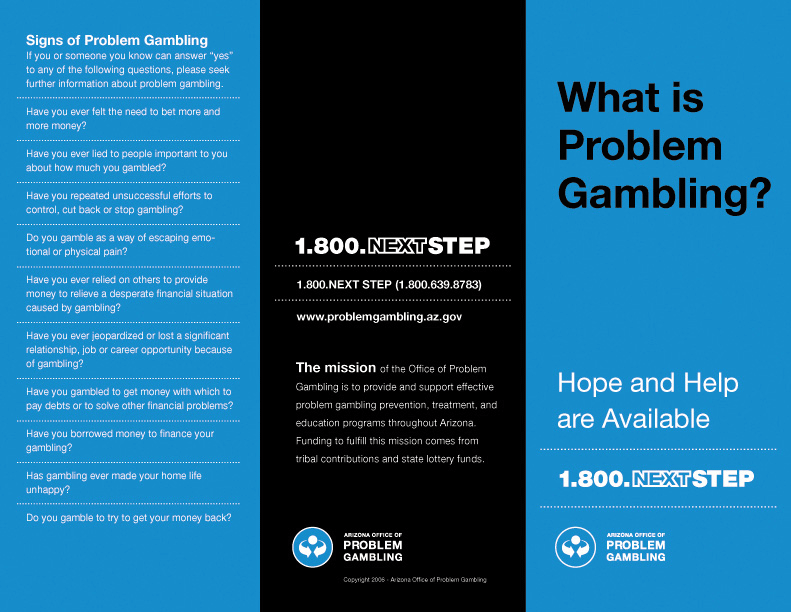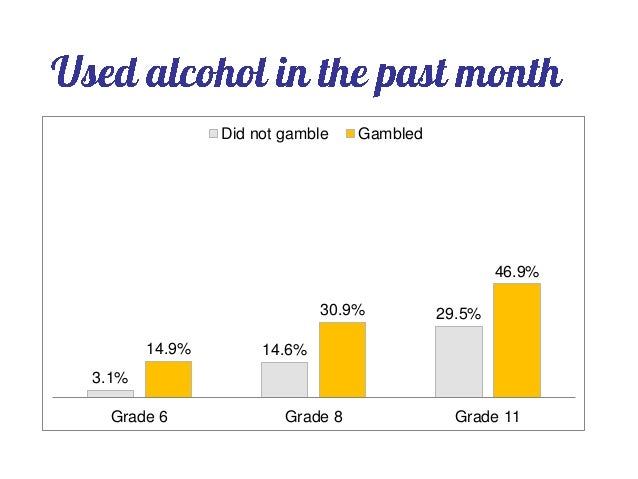Problem Gambling Information
Do you or does someone you know have a problem with gambling?
For a confidential referral, call 800-994-8448 or click the button below to live chat now.
- Problem Gambling Information Websites
- Problem Gambling Information And Resources
- Problem Gambling Information Brochures
The Indiana Problem Gambling Referral Line is funded by the Indiana Problem Gamblers' Assistance Fund.
What is problem gambling?
Problem gambling is gambling behavior which causes disruptions in any major area of life: psychological, physical, social or vocational. The term 'problem gambling' includes, but is not limited to, the condition known as pathological, or 'compulsive' gambling, a progressive addiction characterized by increasing preoccupation with gambling, a need to bet more money more frequently, restlessness or irritability when attempting to stop, 'chasing' losses, and loss of control manifested by continuation of the gambling behavior in spite of mounting, serious, negative consequences.
Could gambling be the problem?
- Have you ever felt the need to bet more and more money?
- Have you ever had to lie to people important to you about how much you gamble?

The National Gambling Helpline is operated by GamCare and offers free and confidential support, information and advice on problem gambling either via telephone or online. It can also provide direction to chat room forums and printed information depending on what you need and when. Problem gambling is an urge to gamble continuously despite negative consequences or a desire to stop. Problem gambling is often defined by whether harm is experienced by the gambler or others, rather than by the gambler's behaviour. Severe problem gambling may be diagnosed as clinical pathological gambling if the gambler meets certain criteria.


A 'yes' answer to either or both of these questions may indicate a problem with gambling.
Reference: Johnson, E.E., Hamer, R., Nora, R.M., Tan, B. Eistenstein, N., & Englehart, C. (1988). The lie/bet questionnaire for screening pathological gamblers. Psychological Reports, 80,83-88.
Events/Training
Indiana problem gambling treatment resource network manual http://www.ipgap.indiana.edu/
Gambling treatment providers
For a list of problem gambling treatment providers in your area, click here.
Additional resources
- Indiana problem gambling awareness program http://www.ipgap.indiana.edu/
- Indiana Council on Problem Gambling, Inc. http://www.indianaproblemgambling.org/
- Gamblers Anonymous Meetings in Indiana http://www.gamblersanonymous.org/
- GAMANON Meetings in Indiana http://www.gam-anon.org/
- National Council on Problem Gambling http://www.ncpgambling.org/
- National Problem Gambling Awareness Week http://www.npgaw.org/
- The voluntary exclusion program http://www.in.gov/igc/2331.htm
- Problem solving court New York Gambling Court
SAMHSA statements
Gambling within forensic populations
Contact information
Larry Long
Program Director - Gambling Treatment, Co-occurring Disorders & Forensic Projects
Division of Mental Health & Addiction
Indiana Family & Social Services Administration
402 W. Washington St., Room W353
Indianapolis, IN 46204
317-232-7891
John.Long@fssa.IN.gov
Mission: To reduce the negative effects of gambling in Lane County communities through coordinating effective prevention strategies.
Our program history
Lane County formed its problem gambling (or “disordered gambling”) prevention program in January 2002. Since then, we have been called upon regionally, nationally and internationally for our resources and innovative prevention approaches. In 2012 our coordinator, Julie Hynes, was the recipient of the National Council on Problem Gambling’s Wuelfing Award for Prevention, the highest honor in problem gambling prevention. She is currently the co-chair of the National Council on Problem Gambling Prevention Committee.

Why the need to prevent gambling disorders?
- Disordered/problem gambling is a “hidden” behavioral addiction
- The latest data on Oregon students shows that gambling starts as early as sixth grade, and that youth who gamble are much more likely to be involved in other risky behaviors.
- Evidence-based efforts for drugs, alcohol and tobacco are effective; effective disordered gambling prevention strategies may actually help reduce the rate of future disordered gamblers by promoting healthy and responsible choices.
Evidence-based work
Our program, like other problem gambling services in the State of Oregon, is funded by a portion of 1% of Oregon Lottery net proceeds. We utilize the Center for
Substance Abuse Prevention’s (CSAP) strategies for effective prevention
efforts, including information dissemination, prevention education, community-based processes, and policy change.
A growing number of prevention experts believe that the risk and protective factors for other problem behaviors (e.g., substance abuse, violence, delinquency, school dropout) are common to those for problem gambling behaviors in youth. We very much support this belief. Therefore,
our program seeks to model its efforts around addressing common risk
factors.
Problem Gambling Information Websites
Our program is targeting the following risk factors in youth:
- Early initiation of problem behavior
- Community laws & norms favorable toward the problem behavior
- Favorable attitudes toward the problem behavior
- Friends who engage in the problem behavior
For more information on how disordered/problem gambling may be related to the
risk & protective factor framework and how evidence-based disordered/problem
gambling prevention programs might be developed, please refer to the
report, Problem Gambling Prevention Resource Guide for Prevention Professionals.
Our goals
- Increase community awareness about the effects of disordered/problem
gambling, and promote awareness that disordered/problem gambling is a preventable and treatable public health problem - Reduce gambling behavior among youth by addressing the risk
factors that may increase the risk of disordered/problem gambling and promoting
the protective factors that may minimize the risk of problem
gambling. - Build and maintain partnerships of individuals, agencies, and
community groups to help support community approach to problem gambling prevention.
Problem Gambling Information And Resources
Lane County is working to achieve these goals through several projects, including the development and provision of educational material and technical assistance to schools and community partners, partnering with other local substance abuse prevention coordinators and other counties’ problem gambling prevention providers, and active involvement in local and statewide efforts.
For other information about our efforts, check out our presentation about problem gambling and the importance of prevention. Note that we’re constantly updating our materials, so the material on this site may not be as up to date as what we can provide to you.
Aligned with Oregon Health Education Standards

In schools, we align our efforts with the Oregon Health Education Standards.
The skills covered by our program include:
- accessing information, analyzing influences, and decision making.
How can we help you?
Are you looking to add information about problem gambling to your classroom, group, or agency program area? We can offer a variety material to you – – ranging from the shortest to lengthier material. Here are a few items we can offer you:
- Presentations and education, targeted to specific population needs
- Policy support and technical assistance
- Professional training workshops (e.g., to addictions, prevention, or mental health providers)
- Other gambling-related information or education; please feel free to contact us!